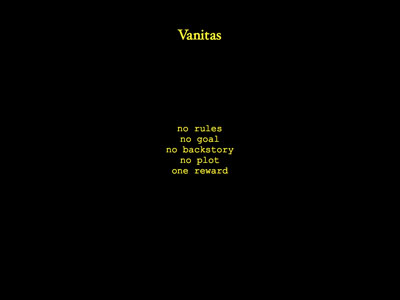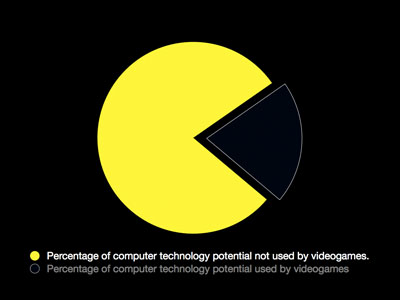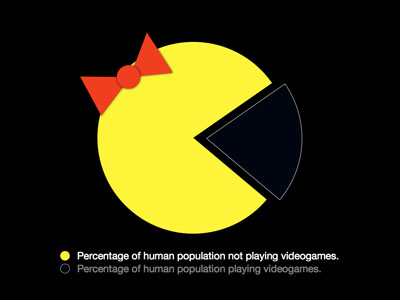Over games
given at the Art History of Games symposium
in Atlanta, Georgia, USA, on 6 February 2010
Tales of Tales
We are not rebels. What we make is perfectly logical to us. We are not reacting against games. We just don't find them entertaining enough, not beautiful enough, not interesting enough, not immersive enough. We realize that this is a matter of taste. But we believe that many people share our taste. So we make games for them.
8 (2002 - 2005)


This is our unfinished epic first game. It was instrumental in helping us figure out what we didn't like about games. And so we left all of that stuff out. But because we left out these things it led to no publisher wanting to fund it, which was essential in those days. When we started, there was no indie scene to speak of.
The Endless Forest (2005 - ∞)


We got a commission to make a game from a museum. Disappointed by not being able to make 8, this was our "anti-game": a game of pure playfulness. The player makes up his own game. We've done a lot of work with the player community. At this point we are constantly designing and evolving the project with the players that love the game.
The Graveyard (2008)


She walks down a path, sits on a bench and listens to a song.
An experiment with how little interaction you had to have in a game. Just a character in an environment. We wanted to put the player inside an unusual body. And let them experience the world from her point of view.
The Path (2006 - 2009)


Since this was to be a commercial game, we wondered if we could we meet gamers halfway. Can a game express life as well as it does death? A game about something rare: about girlness. Specifically, about a girl's pain.
Fatale (2009)


Exploring the contrast between static scene and motion. A game about looking. Being an interactive spectator.
Vanitas (2010)


A thing to play with but isn't a toy. Like a rosary. A tool for rumination.
Games as tools.
The vanity of having this expensive status symbol that in our society is almost not even considered a luxury anymore.
Much like the games people play.
Games, art, death
Games are not art
we would like to clarify something quite obvious.

People have been playing games for as long as they have existed. Even animals play games. Lifeforms with brains seem to have a need for playful behaviour. The reasons for this might be medical, psychological or social. In some species, this playful behaviour is competitive. Perhaps these are species that are naturally aggressive as well as smart enough to realize that playful competition benefits their survival. To achieve that purpose, competition obviously needs to be fair. So they make up rules. And games are born.
Art, on the other hand is not born out of a physical need or an animal instinct. Art is born out of a desire to touch the untouchable. To explore the unknown. Or pay tribute to it. Art is born out of a desire for transcendence. A desire for superhuman understanding. But above all, art is a journey made by a person. For both the creator and the spectator, art is an exploration of the self and its environment. There are no rules in art that cannot be broken. There's no goal that does not evaporate as soon as it is discovered. Art enables us to see the mystery in the mundane and to recognize the unfamiliar. Art is a conscious act of an author who seeks to communicate with an audience in a language without grammar, in a structure that is undefined with no predetermined goal and no rewards but finding yourself.
Art is dead

The modernist program of the previous century has eradicated all human aspiration for greatness. It has exposed transcendence as an illusion and the human individual as a mere bag of bones whose only functions are to vote and to consume. At first science was put in the place of religion, it expanded to take over the place of art only to be dismantled at the end of the century as one more world view, as just another lie.
Modernist art has collaborated in this dehumanization of society. At first it was fresh and welcome. A healthy criticism of values that people might have been taking for granted too easily. But slowly the rebellion turned into canon, the revolutionaries started frequenting the salons and the rebels turned into the new bourgeois. At the end of the century, the artists found themselves in a golden cage, safely disconnected from society and spinning around in an endless loop of self-mockery and clever irony.
This is not the kind of practice that a creative person with a vision wants to be involved in. So they are not. While the museums were getting bigger and more expensive and their collections more tedious and ridiculous, creativity has moved elsewhere. We may not have regained the glory of Vatican-sponsored masterpieces, but work is being done, far away from the museum, in the trenches of the internet and the cesspools of generativity and interactivity. On the world wide web and in videogames.
Videogames are not games

According to popular perception, videogames evolved out of pinball. They started as games to while away some time and money in bars and arcade halls. And moved unscathed to the living room where the technology just kept evolving until videogames started resembling interactive movies or talking paintings. Underneath they were still the same old games and legend has it that this is why they are so successful.
It is true that everybody plays. All humans on this planet play games. We generally tend to play more when we are young. And as we grow older, we become a bit less interested. We play a game once in a while. But it's a lighthearted activity that we can easily abandon when more important things come along.
Not so videogames. We spend hours with these things! We can obsess over videogames for weeks, for months. We stop eating, stop paying attention to our children, to our clothing and facial hair, for the sake of videogaming. These are not games as we used to know them! Somehow we have managed to make games endlessly more engaging. So much so that "addiction" is now being used as a positive buzz word in videogame marketing.
But it's not because videogames are better games! All experts, many of whom are gathered in this room, agree that, in general, videogames are not as good as non-videogames. Chess and Go are still considered unrivaled. RPG fans will always praise their dice and rule books over any computerized rendition of Tolkien's universe. Analog games are simply better games.
Just what is it that makes today's videogames so different, so appealing?
Scientific data


Everybody reads books. Everybody watches films. Everybody listens to music. Everybody plays games. But only a small group of people plays games on computers.The reason for this is lack of variety. There's books for everyone. There's films for everyone. There's music for all tastes. There's many different kinds of playing. But videogames only allow for a single kind.
Videogames technology has achieved a potential for sophistication and variety that is sufficient to appeal to a wide range of people. And they do. Countless are the reports of people attracted by the graphics of a game, or the promise of exploration of a landscape or interacting with their favorite music. Yet every time their enthusiasm is killed by the videogame's insistence on being a rigid rules-based system that challenges you to develop useless skills with the only purpose of increasing a number in the upper right corner of the screen.
Despite a few noble attempts, overall, videogames are empty systems that only serve the purpose of wasting time. For a small subset of the population, this is more than enough. But the rest of us wants a bit more, or simply something different.
Rant

Videogames are stuck. Despite of the ongoing technical evolution and the continuing calls for a new medium, videogames have stopped evolving. They have found their comfort zone. Videogames are happy. They are happy being exactly what they are. Videogames are fun. They nurture our inner child.
While the grown-ups are starving.
























After centuries of blind belief in unstoppable progress, the humanist machine has come to a grinding halt and is crashing into the old ghosts that we thought had been eradicated. We are defending what's left of our ideologies with the same means that we used to seek to abolish. We have lost all direction and are grasping to the straws of ancient values and untenable compromise.
The only question that remains is whether we are going to destroy ourselves
or whether the planet is going to get us first.

Because we lack guidance. Because we lack the proper tools to think, to evaluate, and even to enjoy.

The old media, with their one-way communication and linear formats have ceased to suffice. The complexity of the world has spiralled out of anything that they can handle. What can we do? We need a medium that is interactive, a medium that can generate realities, a medium that is not linear! Is there such a thing?

Yes! There is such a thing. But it has been captured by the videogames industry! And is held hostage. The computer offers us an enormously versatile technology that can help us cope with our problematic lives in clever and beautiful ways. But the hugely successful videogames industry has planted its enormous behind on top of this technology.

We have pleaded with the videogames industry, we have negotiated compromises, a truce perhaps, a loan maybe? For a while the videogames industry pretended that it would change. That it would allow the creation of new things with its technology. At some moments, it even claimed that it would help. It promised it would become bigger and friendlier. That it would let women play too and elderly people. And it kept its promise! It allowed us to create pacifiers and candy.


But pacifiers can only keep us quiet for a little while. And the candy has little nutritional value. We are still hungry. In fact, we are starving. We don't believe videogames anymore. When they say they're going to grow. When they say that one day, we will be playing instead of reading or watching or listening.

We don't believe them anymore!Videogames are too happy. Happy to be games. Happy to be candy and pacifiers. "It's not videogames' fault that people are starving." Videogames can only be games. Videogames cannot grow. Videogames are quite big enough.

You're not going to stop us.
As of now, we're taking matters into our own hands.
We will take your technology and use it for our purpose.
We will take your games and rip out their guts of stupid rules and challenges and blow air into what remains and make pretty bubbles and balloons that take us high into the sky.
We will take your ship and set course to heaven.

You cannot stop us. No longer will you program computers to tell us what to do. No longer will you make us die just because we missed a jump. No longer will you make our lives so miserable that the end of the pain feels like some weird kind of joy. No longer will you frustrate us with your game overs, with your high scores, with gold coins, with your vicious magic circles, with your never ending series of carrots on your never-ending series of sticks.

Our time has come.
A time in which we can tell any story we want to tell
(even ones without conflicts or three act structures).
A time in which we can explore virtual worlds
(without being required to kill 50 warthogs).

A time in which we can play with autonomous characters
(without having to trick their dialog trees).
A time in which we can climb the colossus
(without being forced to strike it with our little sword).
A time in which we can play.
Without rules or goals or winning or losing.
A time in which we can make love, notgames*.
Not games
We are not the only designers who think that computer technology has a lot more to offer than dress up games. But so far, we've all been a bit scattered. And whenever we communicate our ideas in public, or even show our work, we meet with the brick wall of intolerance that is the gamers audience and the games industry. People like games so much that they don't want anyone to make anything else, or even think it.
Rather than continuing the endless debates with fiero-junkies, we have decided to join forces. We're calling this project "the notgames initative". The idea is to explore the potential of digital entertainment and art that is not games. By explicitly rejecting the typical game elements of rules and goals and challenges and rewards, we hope to discover new ways to delight and enlighten our audience. Ways that give us more freedom in terms of choice of subject matter and emotional response.
It's important to point out that "notgames" is not a category of entertainment or art. Instead it is a method of design, a challenge to designers and artists. "Notgames" is not an ideology either. It's not necessary to radically choose to never make games again. You can make a game one day, and a "not-so-game" the other. It's about broadening the spectrum, not narrowing it down.
A few weeks ago, we have started a web forum where we discuss this new form of design in a dedicated environment. We also have a Tumblr stream where we post movies, pictures and quotes that we find inspiring. Soon we'll start a blog with essays and reviews. We're doing contests with certain themes and specific rules. We hope to commission artists and designers to explore this new form of entertainment. And maybe start a sort of label that publishes the results of contests and commissions.
All of this is happening in a not-for-profit context. There's a lot of work to be done. We don't want to be distracted by commercial concerns in this early stage. But we hope and believe that the pioneering work of our little group will inspire and encourage more mainstream designers to create digital entertainment for all the hungry people out there, who are not enchanted by videogames as they are now.
